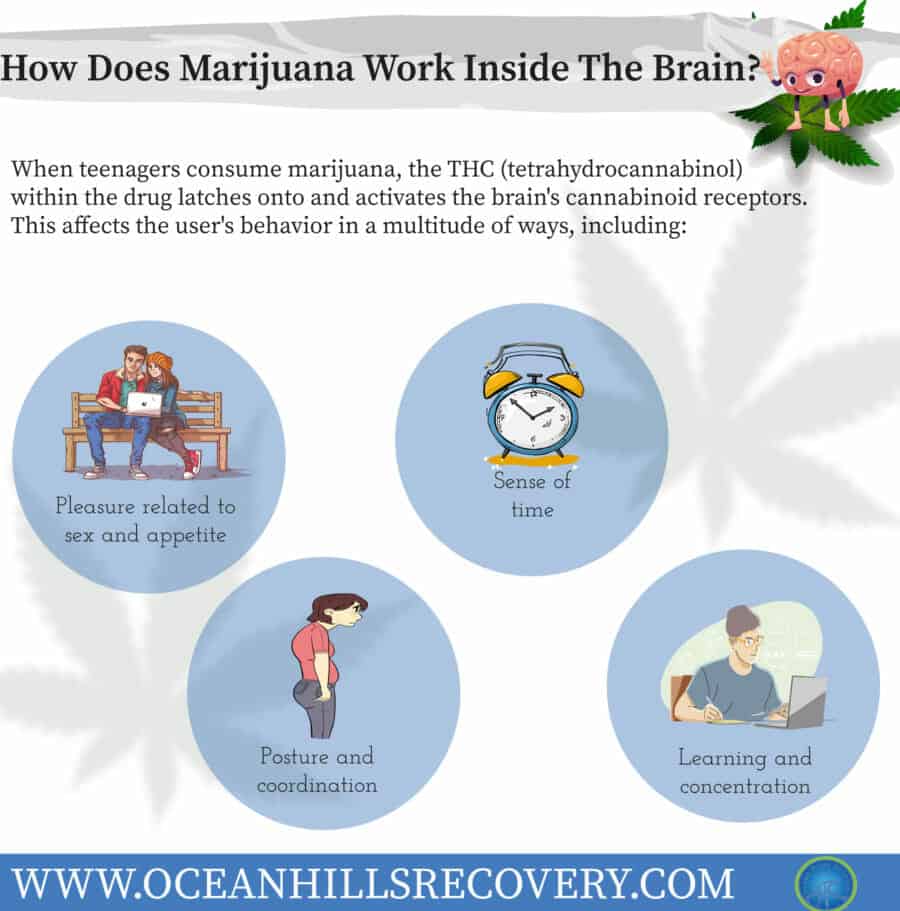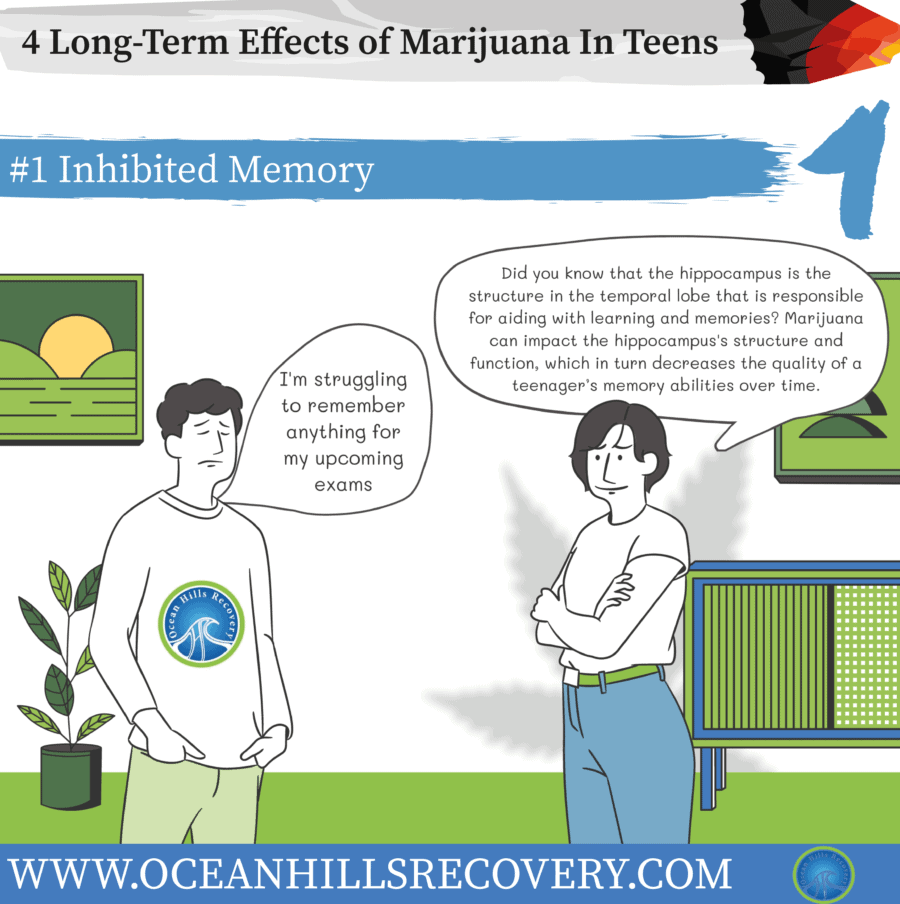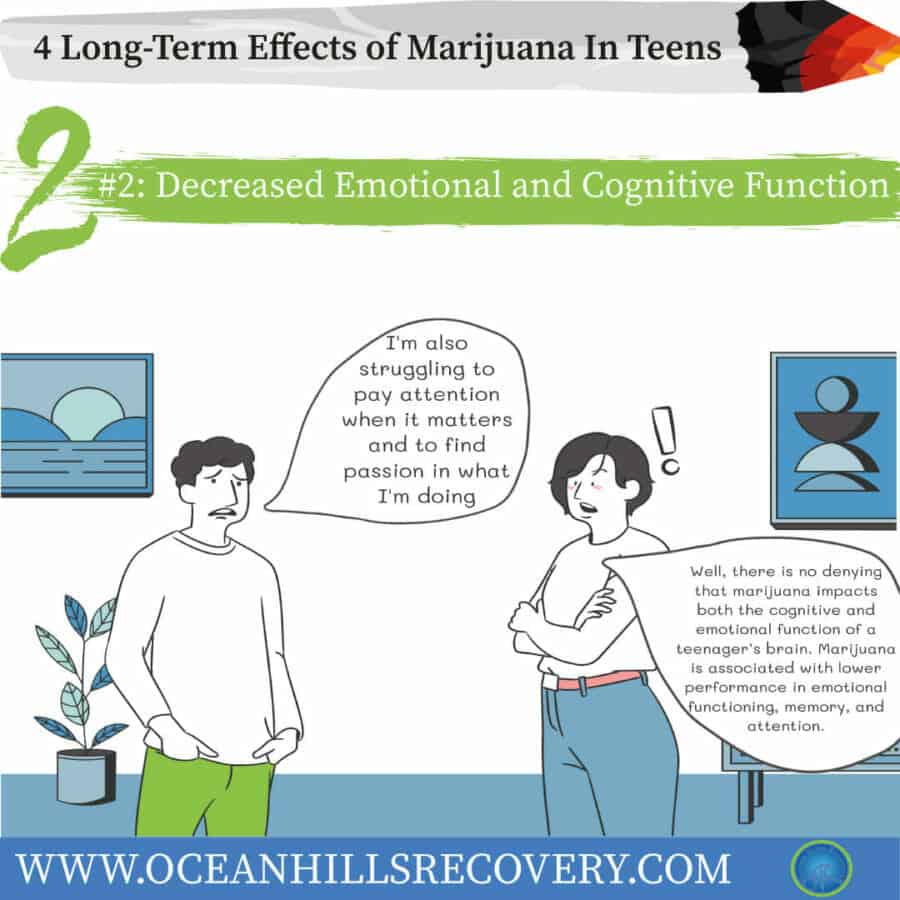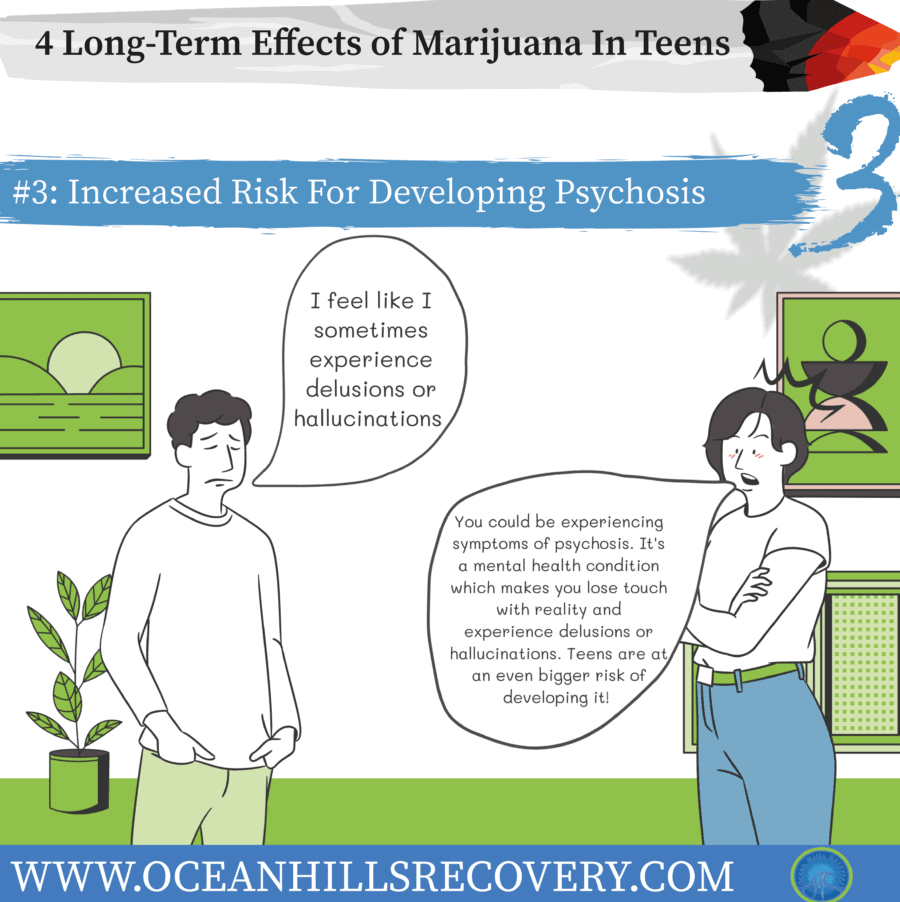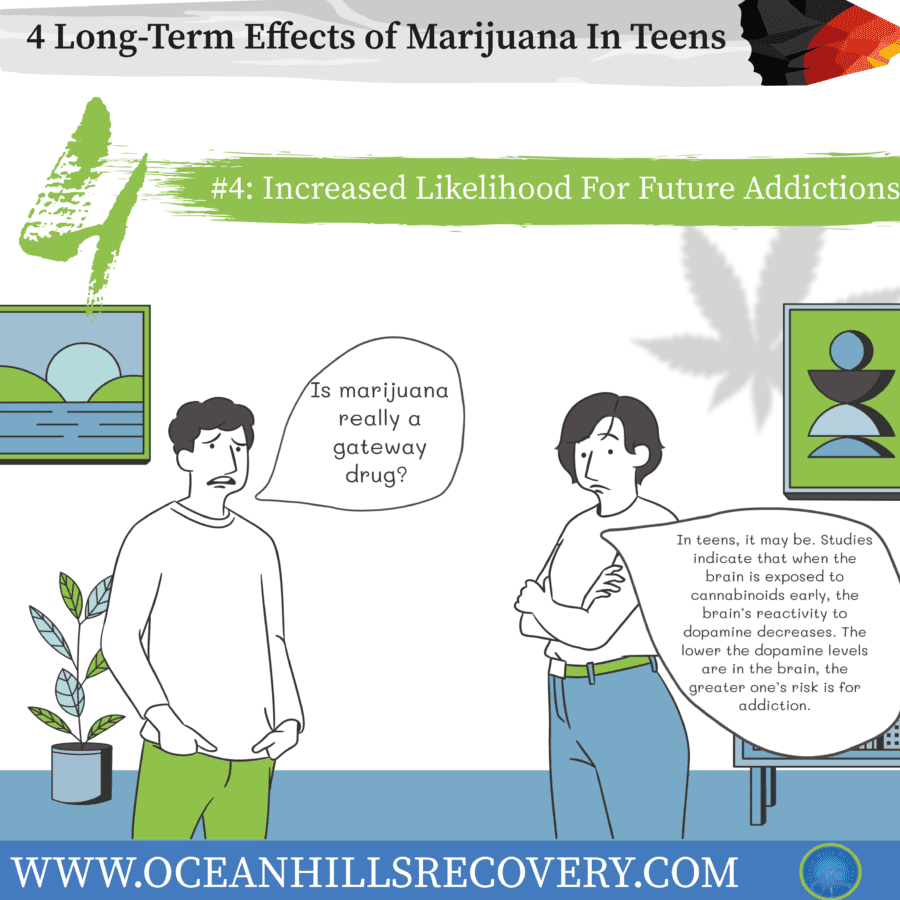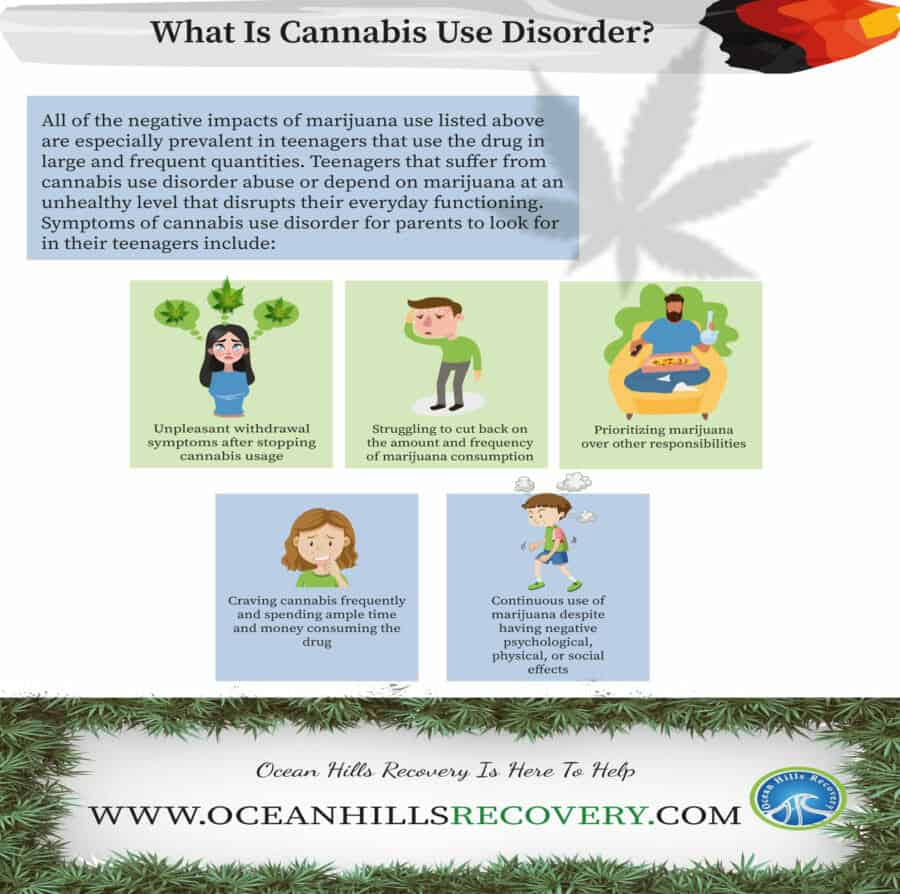Alongside tobacco and alcohol, marijuana is one of the most commonly used drugs by individuals in their teenage years. In fact, one study found that 23% of 12 graders in the United States used marijuana within the past month.[1] As more and more states legalize the sale and distribution of marijuana in the United States, the more commonplace and socially acceptable marijuana is becoming. While it is generally considered a safer drug option than most, it doesn’t come without risks and negative effects. This is especially the case when teenagers partake in marijuana use, as marijuana affects teens’ brains negatively in more ways than one. Read on to learn the impact of marijuana use and abuse on teenagers.
How Does Marijuana Work Inside The Brain?
When teenagers consume marijuana, the THC (tetrahydrocannabinol) within the drug latches onto and activates the brain’s cannabinoid receptors. This affects the user’s behavior in a multitude of ways, including:
- Pleasure related to sex and appetite
- Posture and coordination
- Sense of time
- Learning and concentration
4 Ways That Marijuana Affects Teens’ Brains In The Long-Run
Teenagers and parents need to have a solid understanding of the impact of marijuana usage on the brain. Because a teenager’s brain is still developing and growing, evidence shows marijuana affects the brain’s long-term development, behaviors, and mechanisms. Here are a few of the many ways that marijuana use can affect the health of the brain:
#1: Inhibited Memory
The hippocampus is the structure in the temporal lobe that is responsible for aiding with learning and memories. Marijuana can impact the hippocampus’s structure and function, which in turn decreases the quality of a teenager’s memory abilities over time. Studies showed that in a 25-year study of teenagers who used marijuana, their lifetime exposure was correlated with lower verbal memory scores.[2]
#2: Decreased Emotional and Cognitive Function
There is no denying that marijuana impacts both the cognitive and emotional functions of a teenager’s brain. Studies found that alterations of the brain’s white matter due to marijuana, or the microstructure in the brain that helps with connectivity in a developing brain, are associated with lower performance in emotional functioning, memory, and attention.[1]
Another study found that individuals who heavily used marijuana as teenagers and adults had an average of 8 points decreased from their IQ score between 13 and 38. On the other hand, those who started smoking as adults didn’t have any notable point drops.[3]
#3: Increased Risk For Developing Psychosis
Psychosis is a mental health condition in which individuals lose touch with reality and experience delusions or hallucinations. When marijuana usage is prevalent, teenagers already genetically predisposed to psychosis have a greater risk of developing this serious disorder. In fact, the research found that daily or heavy marijuana usage can increase the likelihood of developing psychosis by five times, a much greater chance than those who don’t use marijuana.[4]
#4: Increased Likelihood For Future Comorbid Drug Addictions
The reputation that marijuana has always carried as the “gateway drug” to other substances turns out to be somewhat true based upon the alterations it can make on the teenage brain’s reward center. Studies on rodents indicated that when the brain is exposed to cannabinoids early, the brain’s reactivity to dopamine decreases. The lower the dopamine levels are in the brain, the greater one’s risk is for addiction.[5]
What Is Cannabis Use Disorder? Does Increased Use of Marijuana Affect Teens’ Brains?
All of the negative impacts of marijuana use listed above are especially prevalent in teenagers that use the drug in large and frequent quantities. Teenagers that suffer from cannabis use disorder abuse or depend on marijuana at an unhealthy level that disrupts their everyday functioning.
Symptoms of cannabis use disorder for parents to look for in their teenagers include:
- Struggling to cut back on the amount and frequency of marijuana consumption
- Prioritizing marijuana over other responsibilities, including school, extracurriculars, or friends
- Unpleasant withdrawal symptoms after stopping cannabis usage
- Craving cannabis frequently and spending ample time and money consuming the drug
- Continuous use of marijuana despite having negative psychological, physical, or social effects
Any teenager or adult that recognizes these symptoms in themselves or a loved one should seek immediate help from a trusted health professional.
Ocean Hills Recovery Is Here To Help
Whether it’s the abuse of marijuana, alcohol, prescription drugs, or another substance, Ocean Hills Recovery is here to help with every client’s unique recovery process. Some of the services offered at this top-notch drug and alcohol treatment center include:
- Inpatient residential treatment
- Drug and alcohol detox programs
- Outpatient and partial hospitalization programs
- 12-step programs
We partner with clients every step of the way to ensure the most supportive and seamless recovery process possible. Contact our team of professionals today to embark on a path towards a substance-free future.
Sources:
[1] https://www.ncbi.nlm.nih.gov/pmc/articles/PMC3930618/
[2] https://www.drugabuse.gov/publications/research-reports/marijuana/what-are-marijuanas-long-term-effects-brain
[3] https://www.drugabuse.gov/publications/drugfacts/marijuana (IQ points)
[4] https://www.drugabuse.gov/publications/research-reports/marijuana/there-link-between-marijuana-use-psychiatric-disorders (psychosis)
[5] https://www.drugabuse.gov/publications/research-reports/marijuana/marijuana-gateway-drug


